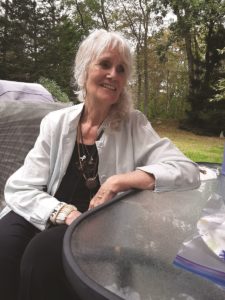Shirley Smith, co-founder of the Outer Cape Committee Against Domestic Abuse (OCCADA), was in court helping a woman who had asked the judge to order additional child support from her former husband. The judge looked at the well-dressed woman before him and said, “Why? You will just spend it on clothes.”
That was 15 years ago. Smith, who is 86, is still seething.
“This woman was tall and elegant and had a great sense of style,” she recalled.

Smith and Martha Ingrum, another OCCADA founder, were not going to stand for that. The pair worked with George Ellison — a retired Vermont district court judge and the committee’s only man — to get that judge recused from the case, and they succeeded.
It was a small victory. The judge, whom Smith would not name because “I may have to appear before him one day,” is still on the bench, she said.
Independence House, the Cape’s main advocacy organization against domestic and sexual violence, will hold an all-day free Prevention Conference on Friday, Oct. 1 (register at independencehouse.org) to kick off a new wave of activism on the Cape, said Chris Morin, Independence House’s director of prevention.
Domestic violence thrives in an atmosphere of secrecy and isolation, which has been exacerbated by the pandemic, advocates said.
They worry about what has been happening behind closed doors. Friday’s conference will be the first since 2018.
Difficult Data
The police in three of the four Outer Cape towns report that the number of domestic abuse calls they received in 2020 decreased. This includes calls that lead to arrests as well as other calls, such as those seeking police help with filing for a restraining order.
The Provincetown police received 48 domestic disturbance calls in 2020, down from 58 calls in both 2019 and 2018. In Wellfleet, 24 such calls were recorded in 2020, compared to 37 in 2019 and 42 in 2018. The Eastham police received 37 calls in 2020, a drop from 51 in 2019 and 72 in 2018.
Only the Truro police responded to more calls last year: there were 53 in 2020, versus 49 in 2019 and 36 in 2018.
But it is hard to interpret these numbers, said Wellfleet Police Chief Michael Hurley, because domestic violence is often “captured at other venues,” such as in school, at a partner’s workplace, or through counseling sessions.
“And, in 2020, people didn’t want cops at the house, bringing the virus to their doors,” Hurley added. “Also, the courts claim they were open — but it was not very welcoming.” That’s why some advocates think the amount of domestic violence did not decline, despite the drop in the number of calls.
The conference this week will focus on policy changes in schools and workplaces, and also on the intersection between domestic violence, sexism, and racism.
“We have clients who are not taken seriously in the court,” Morin said. “Patriarchy is still very much alive. Domestic violence is an epidemic — so, why hasn’t any form of prevention stopped it? There is a lot of evidence that women’s voices are not heard, especially Black women’s voices.”
Smith said that, 28 years ago, when she and five other women from the Outer Cape started OCCADA, they got almost no attention in court. A group member would often sit with the victim who appeared before the judge.
“They were very patronizing to us,” Smith said. “We were ‘a bunch of women.’ ”
As soon as Judge Ellison joined the group, however, “People sat up and listened,” Smith said.
Over the years, the committee enlisted many local police officers to serve as board members, among them former Wellfleet Police Sgt. Arthur “Arty” Parker and former Truro Police Chief Kyle Takakjian.
Advocacy Group Emerges
Smith helped form OCCADA in 1993 while working in Truro with her longtime boyfriend, the late Richard Aiken, at Jack’s Gas. They sold gas, and then just firewood — but always frozen Milky Ways — until 2006. For many, it was a place to sit and talk with Aiken and Smith. “It was like being a bartender or a hairdresser,” Smith said. “People really opened up.”
When a member of her own family said she was being abused, Smith discovered there were no domestic violence resources in Truro. That’s when she called on Martha Ingrum, Anika Costa, Martha Nagy, Roberta Lema, and Peggotty Gilson to form the group with her. Ellison soon joined. He died in 2012, and most of the remaining board members are elderly. “We do need younger members,” Smith said.
Silent Suffering
Domestic violence is almost as intractable as it was 30 years ago, professionals say. Eastham Police Lt. Robert “Gus” Schnitzer said domestic calls are the most dangerous because of the passions and complexity involved.
Schnitzer said he has responded to one home more than 20 times, and he warns against complacency in such situations. That next call, he said, may be the one where the victim is finally ready to leave.

“Some of these people think, if the cops come, my life is over anyway,” said Schnitzer. “My partner is done with me, the kids hate me, and I will lose my job. So, they think they have nothing to lose.” In this scenario, they may consider “death by cop,” he added — that is, attempting to commit suicide by provoking an officer.
Still, police response has changed radically since the 1990s. Up until then, Schnitzer said, most cops had to be pressed even to write up a report on a domestic violence call, which they would often misclassify as a “fight.”
Now, the police reports are extensive, and the “preferred response” is to arrest the aggressor, Schnitzer said.
But the cases often fall apart in court because, in the end, the victim won’t testify against her or his spouse. Judges need to wake up to the complexities of such cases, Smith said. They still assign perpetrators to mandatory 12-step groups, wrongly believing that substance abuse is the root cause of domestic violence. Because of this, Smith believes lifetime judicial appointments in Massachusetts should be eliminated.
What can the public do? Talk about it and raise awareness.
“I remember at one point,” Smith said, “I was really getting discouraged and Arty Parker said, ‘Shirl, just keep talking about it. That is what the abusers don’t want.’ ”
